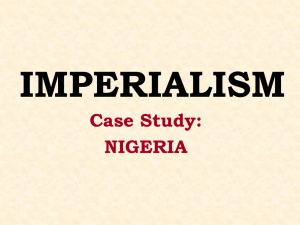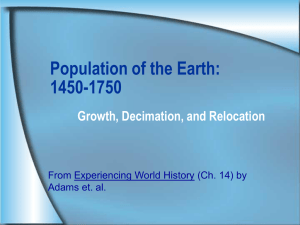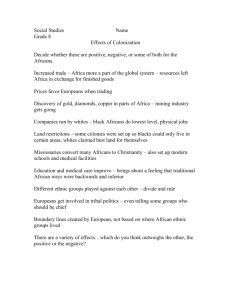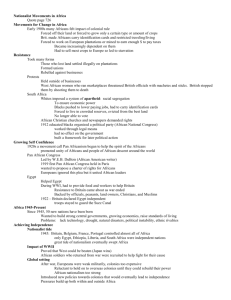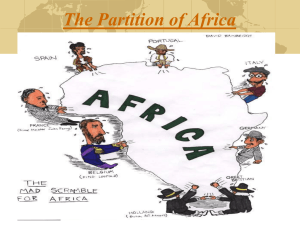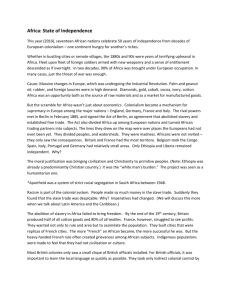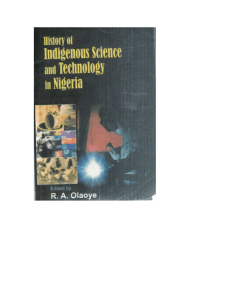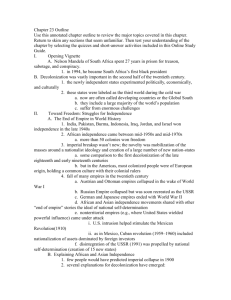TI - International Anti
advertisement
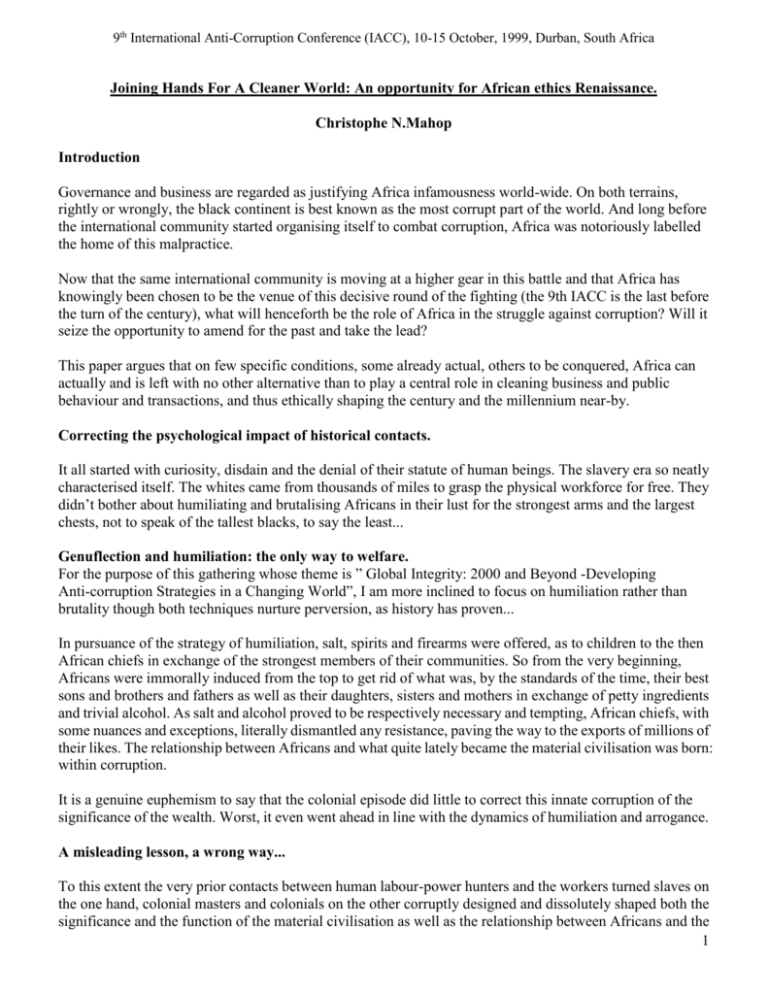
9th International Anti-Corruption Conference (IACC), 10-15 October, 1999, Durban, South Africa Joining Hands For A Cleaner World: An opportunity for African ethics Renaissance. Christophe N.Mahop Introduction Governance and business are regarded as justifying Africa infamousness world-wide. On both terrains, rightly or wrongly, the black continent is best known as the most corrupt part of the world. And long before the international community started organising itself to combat corruption, Africa was notoriously labelled the home of this malpractice. Now that the same international community is moving at a higher gear in this battle and that Africa has knowingly been chosen to be the venue of this decisive round of the fighting (the 9th IACC is the last before the turn of the century), what will henceforth be the role of Africa in the struggle against corruption? Will it seize the opportunity to amend for the past and take the lead? This paper argues that on few specific conditions, some already actual, others to be conquered, Africa can actually and is left with no other alternative than to play a central role in cleaning business and public behaviour and transactions, and thus ethically shaping the century and the millennium near-by. Correcting the psychological impact of historical contacts. It all started with curiosity, disdain and the denial of their statute of human beings. The slavery era so neatly characterised itself. The whites came from thousands of miles to grasp the physical workforce for free. They didn’t bother about humiliating and brutalising Africans in their lust for the strongest arms and the largest chests, not to speak of the tallest blacks, to say the least... Genuflection and humiliation: the only way to welfare. For the purpose of this gathering whose theme is ” Global Integrity: 2000 and Beyond -Developing Anti-corruption Strategies in a Changing World”, I am more inclined to focus on humiliation rather than brutality though both techniques nurture perversion, as history has proven... In pursuance of the strategy of humiliation, salt, spirits and firearms were offered, as to children to the then African chiefs in exchange of the strongest members of their communities. So from the very beginning, Africans were immorally induced from the top to get rid of what was, by the standards of the time, their best sons and brothers and fathers as well as their daughters, sisters and mothers in exchange of petty ingredients and trivial alcohol. As salt and alcohol proved to be respectively necessary and tempting, African chiefs, with some nuances and exceptions, literally dismantled any resistance, paving the way to the exports of millions of their likes. The relationship between Africans and what quite lately became the material civilisation was born: within corruption. It is a genuine euphemism to say that the colonial episode did little to correct this innate corruption of the significance of the wealth. Worst, it even went ahead in line with the dynamics of humiliation and arrogance. A misleading lesson, a wrong way... To this extent the very prior contacts between human labour-power hunters and the workers turned slaves on the one hand, colonial masters and colonials on the other corruptly designed and dissolutely shaped both the significance and the function of the material civilisation as well as the relationship between Africans and the 1 9th International Anti-Corruption Conference (IACC), 10-15 October, 1999, Durban, South Africa physical well-being in general, which appeared, per se, thoroughly rotten. Likewise, in setting up political systems, with differences in degree rather than in nature, the colonial masters meticulously chose to personally advance and to empower yes-men at the expense of Africans with aptitudes and vision. For as Africans started receiving ”gifts” through wrongdoing, not as deserved incentives, friendly ”presents” or ”fair wages”; and political power, not on the basis of their capabilities as popular leaders or elites, but as yes-men and mere tools whose obedience and worship to the colonial masters were guaranteed, they still find their way likewise today either to earn a living or to increase their personal wealth and power. Which means that the basically corrupt connection still governs most of African societies. That is why, too, decades after independence, neither the former colonial masters, nor Africans have decisively caught up with this long lasting misrepresentation up to now, if either or both ever truly wanted. Even today, as regards this relationship, the congenital ill-understanding remains broadly the rule. Led by their rulers, most of whom fail to exemplify, Africans seem to have learned from this traumatic past that material issues and transactions might be incompatible to right, morals and dignity. Moreover, this corrupt way cast an abysmal doubt over material, moral and social rewards to be expected from hardworking, courage and integrity. It is indeed noteworthy recalling that roughly nine in ten slaves were hardworking and courageous, a set of qualities hard to find among senior collaborators of colonial masters tens and tens of years later, yet in whose hands directly or indirectly, the African share of wealth was exclusively put at the time. But then, what is money? What are the ends of the material wealth? Are they means for human development and welfare regardless of any geographical, racial or gender consideration? Are they a lump of wood in the hands of a minority to crumble and overlook other human beings as a consequence of their place of birth or residence, their race or their gender instead? Are Africans partners of North in the world economy or are they mere playthings? A way has to be found to get the answers to these questions right. In the meantime let us note yet again that contrasted with the objectives of sustainable development all contemporary African countries officially desire to achieve, this lesson, along with its inherent practices - that admittedly benefited a thin minority and still does - are both misleading and wrong. They are even at odds, that is, the latter hugely impedes the former. Though it underwent the worst events and abjectness at a scale one cannot imagine, Africa isn’t however the only part of the world where brutality and humiliation were used as instruments for taking control of material resources at the expense of the natives. Any such reference logically opens the chapter of invasions, conquests and wars that moulded Africa, Asia, America, Europe and Oceania, that is, the world we live in today. Still, invasions did not always come from foreigners: Africans invaded Africans, Asians invaded Asians, Europeans invaded Europeans.. .and sometimes supplemented enslavement to their invasions. Again as in the cases of the historic slavery period and colonialism, these heavy-handed controls of material resources aimed to expand and nurture and strengthen the hegemony and the political and the strategic power of the invader(s). So to stress that no plea for African innocence should go unscrutinised, inasmuch as it would serve complacency and would provide a comfortable, unbalanced and one sided version of the history as well. Here again the more African powerlessness and failures during the slavery period and early colonialism can be understood, as Africans were uneducated at the time and therefore fragile and vulnerable, the more, conversely, African elites responsibilities increase since late colonialism and independence. 2 9th International Anti-Corruption Conference (IACC), 10-15 October, 1999, Durban, South Africa Hence, forty years after independence, African records in politics and economics as well as in the fields of peace, human rights, credibility, dignity and respect give a bold and strong evidence that what has been going on leads to nowhere as does corruption or the absence of ethics in general. Yet such a historical infrastructure inspires a couple of questions: can economics be ethical at all? Can African economy be ethical and corruption free? If it is true that we cannot erase the facts which occurred nor changed them, or think about our future backwardly, it is true, too, that we can and we must amend and change the spirit and the blindness which animated invaders and colonial masters and who still animate some business leaders and African and non African elites, for the good of Africa and the world. In so doing, we will give birth to new economic ways in Africa consistent with this ever connected world. Christophe N.Mahop is a Civil Administrator, discharging the responsibilities of State Inspector with the Supreme Audit Institution of Cameroon. He has made this contribution in his capacity as Chairman of the Council for Ethics in Governance and Economics(COLLEGE), an abbreviation drawn from the french denomination (Collectif pour l'Ethique dans Ia Gouvernance et l'Economie). 3
